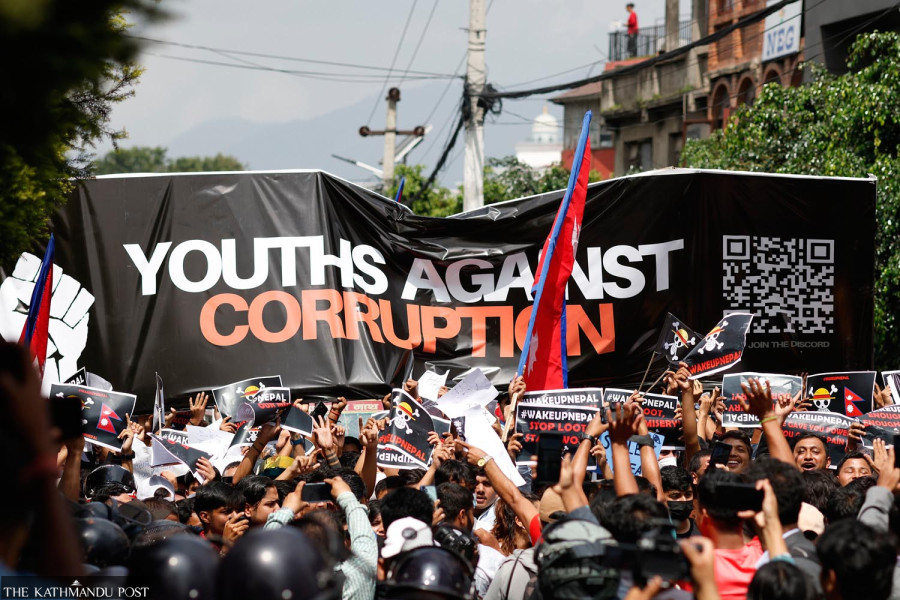Editorial
Heralding change
Dear readers, today, views of Gen Z:
Spirit of our time
I was having a conversation with my parents, and I realised how different our feeds are, the kind of content we actually see. My parents, and people their age, are very definite in their opinions. They see the protests of our generation in a certain way. Some of what we see on social media overlaps with theirs, but a lot of it does not. For example, they don’t come across the trending hashtags we do—like those rejecting people such as Rabi Lamichhane in power, or calling for no anarchy at all.
What many people in Nepal don’t really realise is that a lot of youngsters don’t want violence. We’re not happy about all the vandalism happening in schools, private buildings, or even public spaces. What they don’t understand is that there’s a difference between protest and the spirit of anarchy. Some of the content out there frames it differently, like threats to “nepo kids” in the comments section, or even to politicians. I’ve seen disturbing videos: One of Bishnu Poudel being carried around without clothes.
I know my thoughts are scattered, but what I feel is that the spirit of our time is very different. And when I say “our time,” I mean those of us who don’t want anarchy or violence. That spirit is completely different from what shows up in the feeds of people outside our generation. And that’s the problem—the algorithm keeps feeding people more of whatever they already engage with. So those who watch violent or anarchic content just get more of it, reinforcing that view.
It’s worrying, but that is how the algorithm works.
Sambriddhi Aryal
Questions
Nineteen people lost their lives yesterday for what? For anarchists to thrive in violence? Did we not fall to the same level at the mere taste of power? I see my country burn. Was this why our generation went to the streets? So much violence, so much chaos. How am I supposed to believe this mob is going to lead my country to greatness, or am I supposed to believe in those who fueled and enabled this mob to lead my country into greatness? How did we fall so low as to let rage, revenge, and vendetta lead us, barely being able to distinguish right from wrong? Was this just? Is this what justice means? I am worried about my country and the power vacuum that exists. How can we ensure that another puppet does not rise to take advantage of this situation and seize power, leaving us with the same fate? What happened yesterday has no justification; it was wrong.
Young people with so much potential lost their lives, and the government lost its legitimacy, but now I wonder whether our cause has lost its legitimacy, or does it still hold to its value? Will this take us to darker days or into a brighter future? I hope all the souls that departed from us rest in peace, and a path to a brighter future comes on the horizon.
Samyog Niraula
For unity
Since I’m not in Nepal right now, I don’t feel it’s my place to speak too much about the protest itself.
But I am deeply grateful to everyone who came out on September 8 to stand against corruption, and my heart goes out to those who never made it back home. What happened today was powerful and necessary to spark change. Yet, it’s also heartbreaking to see the destruction that followed. Schools, malls, restaurants, Singha Durbar and other government offices, places that hold parts of our identity and future; they shouldn’t have been arsoned and destroyed. Yes, change came, and the Prime Minister resigned, but in the process, we also lost things that cannot be easily replaced. My hope is that everyone in and outside of Nepal can unite not only to demand change but also to rebuild what has been broken together.
Animesh Basnet
For youth-led renewal
Nepal has entered a historic turning point. The resignation of Prime Minister KP Sharma Oli on September 9, following unprecedented Generation Z–led protests, is not just the fall of a leader but the awakening of a nation’s conscience.
The controversial ban on 26 social media platforms, intended to stifle misinformation, instead ignited a movement. For youth, it was not about Facebook or YouTube alone, it was about their right to speak, dream, and demand accountability. Placards reading “Our Future, Our Voice” and “Corruption Steals Dreams” captured the essence of a generation that refuses to be silenced. Tragically, at least 19 young lives were lost in clashes with security forces, a painful reminder of the cost of change.
The aftermath has left the political establishment fractured, with cabinet resignations and lawmakers distancing themselves from the old guard. Amid this uncertainty, new possibilities are emerging. Figures such as Balendra Shah and Kulman Ghising embody the transparency, integrity and reformist vision that today’s youth seek. They symbolise a departure from entrenched political dynasties and the dawn of citizen-driven governance.
Gen Z has articulated clear priorities: Anti-corruption reforms, transparency, protection of digital freedoms, inclusion of youth voices and economic policies that create opportunity. These are not radical demands but foundational principles of any healthy democracy.
Nepal’s ruling elite now face a choice: Either embrace this generational shift by forming an inclusive, reform-oriented transitional government, or risk deepening instability by ignoring it. What the streets are calling for is not chaos, but credibility.
The resignation of the Prime Minister is not an end—it is a beginning. It is a chance for Nepal to build a leadership culture grounded in integrity, innovation and accountability. The question before us is not whether change will come, but whether we will have the wisdom to channel it into lasting progress.
Stephen Biswakarma




 9.7°C Kathmandu
9.7°C Kathmandu














